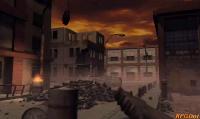| |
Site Navigation
Main
News
Forums
Games
Games Database
Top 100
Release List
Support Files
Features
Reviews
Previews
Interviews
Editorials
Diaries
Misc
Download
Gallery
Music
Screenshots
Videos
Miscellaneous
Staff Members
Privacy Statement
|
|
Our last poll looked at first preference for settings and came back overwhelmingly in favour of fantasy formats with high-fantasy pulling over 42% and original fantasy 27% for a combined 74%. Post-apoc (11.5%) just pipped cyberpunk (10%) with sci-fi flagging at 7.2%. We'll look at settings in a future Side Quest - for now we have a new poll on combat preferences.
This Side Quest was intended to look at "real" innovation and ended up a rant-come-cry-for-help...read on.
If you take a wider interest in general gaming news, you may be aware that Nintendo recently unveiled the controller for their next-gen console, Revolution. It’s undoubtedly an unusual piece of equipment and opinions are divided between the extremes of “Innovation! Nintendo rules!” and “What the hell do I do with a remote control? Sux like the Powerglove”.
Respected games journalist Kieron Gillen (Eurogamer and elsewhere) wrote this in his blog:Whether they get it or not immediately divides the entire gaming universe into cowardly, tedious luddites who are perfectly happy to sit in their squat-like holes forever and Good People. If you don’t like the Revolution controller, you are fundamentally part of the problem and killing the fucking art form. No doubt this is a colourful piece of hyperbole but I suddenly felt like a luddite. What does this have to do with cRPGs? Nothing directly, but as a fan of “old school” cRPGs, Kieron’s comments prompted me to think about innovation in cRPGs and wonder for a minute if I really was sitting in a squat-like hole, killing the art form. What “innovation” am I talking about? Game producers have been selling the steady movement towards genre blending of action with RPG elements as innovating an arkane genre. Are they right and I just can’t see it from my hole?
I decided the answer was an emphatic “No!”
It’s not that I have a problem with real innovation or creativity itself in any way. I enjoy a good action game, too. The problem is that the action elements introduced under the guise of innovation in this genre are usually misbegotten business decisions and have nothing to do with improving the art form. I completely understand the imperative to shift enough boxes, but funnily enough, the results just often don’t succeed. One of the reasons is that in the headlong rush to attract a wide audience, game producers seem to focus on the action and forget why they were making some form of RPG in the first place.
Chris Bateman made a fascinating point he calls the “set intersection error”: the audience for a game that joins two genres isn’t necessarily the combined total of players for those genres – it’s the intersection of those sets (apologies to those who happily left set math behind in high-school). Depending on the design, rather than appealing to both action and RPG players, you might be frustrating both - leaving a small audience in the middle. I think action gamers who pick up an action RPG actually expect some RPG elements – they’d have stuck with God of War otherwise.
So, I am begging the next action RPG / action game with RPG elements developer to think about the actual purpose of the RPG side of the equation. Here’s an innovative idea that is almost unique in the market: embrace the RPG elements. Give the players character development choices that impact the actual gameplay, different approaches to the quests, branching story lines – perhaps even a faction or two. I’m not suggesting a heavy reliance on hardcore stats but an understanding that good RPGs are all about choice – and consequences. There’s a reason Diablo 2 has never been outdone as a point-and-click action RPG despite the ordinary graphics (even at launch), simplistic basic gameplay and the intervening years -- and that’s the hidden depth. It’s easy to play but hard to master with skill trees and equipment combinations that are remarkably deep. There’s a reason Deus Ex soared but Deus Ex: Invisible War fell flat on its face. Isn't it time game producers worked this out?
As always - we'd love to hear what you think. |
|
|





 Side Quest: Of Luddites and Revolutions
Side Quest: Of Luddites and Revolutions